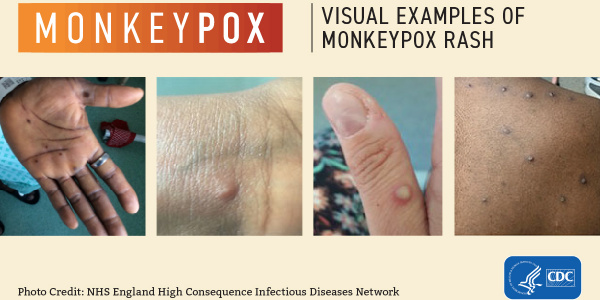More than two years into the COVID-19 pandemic, it can feel overwhelming to hear of another global, transmittable disease. Learning the facts about monkeypox can be helpful in protecting against the virus and reducing fears about its spread. We’ve gathered the latest information from the Centers for Disease Control and Prevention (CDC), which is tracking the current outbreak, including cases identified in this country.
What Is Monkeypox and Is It a New Disease?
Monkeypox is a rare disease caused by infection with the monkeypox virus. While in the same virus family as smallpox, monkeypox has milder symptoms and is rarely fatal. Monkeypox is not related to chickenpox.
The virus was discovered in 1958 when two outbreaks occurred among monkeys kept for research, though the source of the disease remains unknown. The first human case of monkeypox on record was in 1970.
What Are the Symptoms?
Symptoms of monkeypox, which usually appear one to two weeks after infection, can include:
- Fever
- Headache
- Muscle aches and backache
- Swollen lymph nodes
- Chills
- Exhaustion
- A rash that can look like pimples or blisters
The rash may appear on the face, inside the mouth, and on body parts like the hands, feet, chest, genitals, or anus. The rash goes through different stages before healing completely. People sometimes get a rash first, followed by other symptoms; others only experience a rash.

Monkeypox can spread from the start of symptoms until the rash has fully healed, topped by a fresh layer of skin. Typically, the illness lasts 2–4 weeks.
How Serious Is Monkeypox?
The two types of monkeypox virus are West African and Congo Basin. The current outbreak is the West African type, which has a survival rate of more than 99%. Symptoms can be extremely painful, and there is a risk of permanent scarring from the rash.
People with weakened immune systems or a history of eczema, children under 8 years of age, and women who are pregnant or breastfeeding may have a higher risk of serious illness or death.
The Congo Basin type of monkeypox virus (which is not currently circulating) has a survival rate around 90% for most people.
Should I Be Worried About Getting Monkeypox?
Currently, the risk of getting monkeypox in the U.S. is considered low. Monkeypox symptoms must be present for the virus to be spread to others. You can check the CDC website for the latest updates on the outbreak.
How Does Monkeypox Spread?
People who do not have monkeypox symptoms cannot spread the virus. Monkeypox spreads person-to-person through:
- Direct contact with the infectious rash, scabs or body fluids
- Respiratory secretions during prolonged, face-to-face contact or during intimate physical contact
- Contact with items, such as clothing or linens, that previously touched the infectious rash or body fluids
The virus can spread during pregnancy to the fetus via the placenta. It’s also possible for people to get monkeypox from infected animals, by being scratched or bitten by the animal, or by handling or eating meat or using products from an infected animal.
Is Monkeypox a Sexually-Transmitted Disease?
Though not considered a sexually transmitted infection, monkeypox can spread during intimate physical contact between people. While many affected in the current global outbreaks are gay, bisexual, or other men who have sex with men, anyone in close contact with someone who has monkeypox can get the illness. It is not known at this time if monkeypox can spread through semen or vaginal fluids.
How Is Monkeypox Treated?
Monkeypox typically lasts 2–4 weeks. There are no treatments specifically for monkeypox infections. However, antiviral drugs and vaccines that protect against smallpox may be used to prevent and treat monkeypox, since the viruses are genetically similar. Antivirals, such as tecovirimat (TPOXX), may be recommended for people who are more likely to get severely ill, like patients with weakened immune systems.
See a health-care provider if you have a new or unexplained rash or other symptoms, and remind the provider that monkeypox is circulating. If you are sick with monkeypox or awaiting test results, isolate at home and avoid close contact with others (including pets). If you test positive, remain isolated until your rash has healed, scabs have fallen off, and a layer of fresh skin has formed.
Could My Pet Get Monkeypox?
Monkeypox is zoonotic, meaning it can spread between animals and people. The CDC does not currently believe monkeypox poses a high risk to pets.
Can Monkeypox Be Prevented?
There are steps you can take to help prevent getting monkeypox:
- Avoid close skin-to-skin contact if someone has a rash. Don't touch the rash or scabs of a person with monkeypox.
- Avoid hugging, kissing, sex or close talking with someone with monkeypox.
- Do not handle or touch bedding, towels, or clothing of a person with monkeypox.
- Wash your hands often with soap and water or use an alcohol-based hand sanitizer.
Is There a Vaccine for Monkeypox?
There are two vaccines for preventing monkeypox, although data on the effectiveness in the current outbreak is not yet available. The CDC recommends vaccination for people who have been exposed to monkeypox and people who are at higher risk of exposure, such as those with close contact to someone with the virus.
The vaccine ACAM2000 should not be used in people who have certain health conditions, including a weakened immune system, skin conditions like atopic dermatitis/eczema, or pregnancy. Learn more information about monkeypox vaccination and as always, talk with your health-care provider with any questions or concerns you may have.